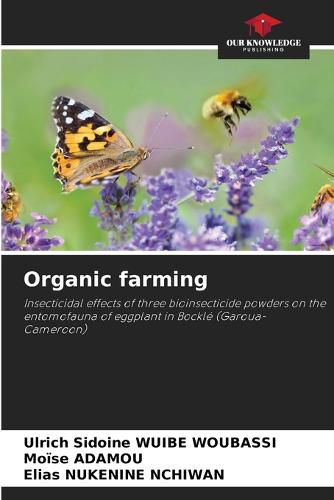Readings Newsletter
Become a Readings Member to make your shopping experience even easier.
Sign in or sign up for free!
You’re not far away from qualifying for FREE standard shipping within Australia
You’ve qualified for FREE standard shipping within Australia
The cart is loading…






In Bockle (Garoua-Cameroon), from August 01 to December 22, 2020, the insecticidal effect of the powders of three plants (Azadirachta indica, Carica papaya and Senna didymobotrya) was observed on the entomofauna of Solanum melongena in order to evaluate the population dynamics of insect pests, to collect data on the number of leaves, flowers and fruits per plant, to study the foraging activity of the floricultural insect Apis mellifera and to determine the cumulative impact of botanical insecticides and this bee on the seed yields of this Solanaceae. The experimental field was arranged in completely randomized blocks. All insecticides tested very significantly reduced the pest population and influenced the activity of floricultural insects. The combined action of the powdered insecticides and flowering insects increased the fruiting rate, the average number of seeds per fruit and the percentage of normal seeds. In order to protect the eggplant crop from insect pests while preserving insect pollinators, the use of botanical insecticides should be encouraged as an alternative to pesticide use.
$9.00 standard shipping within Australia
FREE standard shipping within Australia for orders over $100.00
Express & International shipping calculated at checkout
In Bockle (Garoua-Cameroon), from August 01 to December 22, 2020, the insecticidal effect of the powders of three plants (Azadirachta indica, Carica papaya and Senna didymobotrya) was observed on the entomofauna of Solanum melongena in order to evaluate the population dynamics of insect pests, to collect data on the number of leaves, flowers and fruits per plant, to study the foraging activity of the floricultural insect Apis mellifera and to determine the cumulative impact of botanical insecticides and this bee on the seed yields of this Solanaceae. The experimental field was arranged in completely randomized blocks. All insecticides tested very significantly reduced the pest population and influenced the activity of floricultural insects. The combined action of the powdered insecticides and flowering insects increased the fruiting rate, the average number of seeds per fruit and the percentage of normal seeds. In order to protect the eggplant crop from insect pests while preserving insect pollinators, the use of botanical insecticides should be encouraged as an alternative to pesticide use.